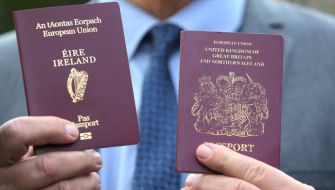An on-the-run Irish sex offender who on Tuesday lost his appeal against extradition to the United States is being returned to custody and not to a “colony of homeless sex offenders”, the Court of Appeal has ruled.
Martin Jude Wall (47) fled the US after claiming a probation officer in Savannah, Georgia, told him to “go and live in a tent” when he complained the state’s strict parole restrictions governing sex offenders had left him without a job or anywhere to stay.
Wall, who was caught in a police sting when he tried to arrange a meeting with a 13-year-old girl for “indecent purposes”, was later arrested in Ireland in December 2020 on foot of a warrant issued by the State of Georgia. He has been fighting against attempts to send him back across the Atlantic ever since.
At the Court of Appeal last month, Wall’s lawyers argued there was a “real and substantive” risk his human rights would be breached if he was returned to the US.
Shane Costelloe SC, for Wall, said that in “the United States of America it was okay to tell people on probation to go and live a tent” at the side of rail tracks “where they would be subjected to violence on a daily basis” and be required to dig a hole in the ground to use as a toilet.
It was “borne out by the evidence”, Mr Costelloe added, that this would be the probation regime his client would face if the court ruled against him, and he was extradited.
'Colony of homeless sex offenders'
But in a judgment delivered on Tuesday by Ms Justice Aileen Donnelly, Wall’s appeal against a High Court decision issued last October to sanction the extradition request was dismissed.
Ms Justice Donnelly, sitting with Court President Mr Justice George Birmingham and Mr Justice John Edwards, said the appellant had claimed he “was at real risk of being exposed to inhumane treatment” if returned to the US.
The judge, however, noted that the reality for Wall would be a return to custody and not to a “colony of homeless sex offenders”.
The appellant, she said, had feared going back to the “conditions of poverty and homelessness” he claimed he had experienced previously following his release from parole.
But Ms Justice Donnelly said “the most likely outcome” for the appellant on his return to the US was “a term of imprisonment”.
Ms Justice Donnelly also observed that Wall was not required to reside in Savannah – where convicted sex offenders were prevented from living or working within 300 metres of places where children congregated, such as schools, bus stops and shopping malls – and could live and seek employment elsewhere in the State of Georgia.
After the judgment was delivered, Mr Justice Birmingham said that Mr Justice Paul Burns’ ruling to extradite Wall – who sat with his head bowed during most of the hearing – was now revived.
Wall had originally appealed Mr Justice Burns’ decision on the grounds the judge had failed to “to carry out any further analysis as to whether the appellant would be subject to inhuman and degrading treatment” if returned to the US.
In an interim judgment issued by the Court of Appeal in February, Ms Justice Donnelly stated the court required further submissions from both parties regarding Wall’s claims before ruling.
Human rights
At the hearing in April, Mr Costelloe told the three-judge court there was a real risk his client’s rights under Article 3 of the European Convention of Human Rights (ECHR) would be breached if he was sent back to the US.
Under Article 3 of the ECHR, citizens of signatory nations are protected from deportation or extradition if there is a real risk they will face torture or inhuman or degrading treatment or punishment in the country concerned.
Mr Costelloe said the “court below” had “made a finding based on evidence not available to it”.
The decision to return his client to the US had been based on that “erroneous finding” and “in these circumstances, this appeal should be allowed”, counsel said, adding that test in this appeal was whether his client’s Article 3 right would be breached if he was extradited.
“Once I have met that test, you must have evidence rebutting it,” Mr Costelloe told the court.
Patrick McGrath SC, for the Attorney General, said there was “no doubt Mr Wall will be incarcerated for some period of time if he is returned to the US”.
Regarding the possibility of probation, counsel said that risk was too “remote and speculative” and the court should disregard it.
Mr McGrath said Mr Justice Burns was correct to order Wall’s extradition and there had been no error in principle by the judge.
“Sight should not be lost of the facts in this case,” he continued. “There was a house available to [Wall] at some stage and he did not have to live in a tent.”
Internet chatroom sting
Wall, whose last address in Ireland was in Clontarf, Dublin, but who is now a prisoner at Midlands Prison, had been convicted of trying to entice a child for sexual purposes after he set up a meeting with a ‘13-year-old’ girl he met in an internet chatroom.
The girl’s account, however, was fictitious and had been created by US police officers to snare possible sex offenders. Wall was subsequently detained when he travelled to meet the ‘girl’ in person.
Previously, the High Court was told that in 2012 Wall had pleaded guilty through plea-bargain to attempting to entice a child for indecent purposes. He had sent messages and a nude photo of himself from his phone through a chat-group to a user he believed was a 13-year-old girl.
Mícheál P O'Higgins SC, for the Minister for Justice, told the court that detectives created a "non-sexually suggestive" profile and that Wall tried to initiate a meeting.
Wall said in one message that he preferred "younger girls but I guess you're okay".
Mr O’Higgins said that Wall initiated "sex talk" and that he suggested meeting the girl for sex acts.
Wall told the officers controlling the profile that his wife had cheated on him and that he was looking to take revenge on her with the girl, whom he told them was "very hot, very hot".
One message from Wall read: "Are you going to have me arrested?"
After sending the photo, Wall suggested that he and the girl should meet, and detectives detained him at that location.







